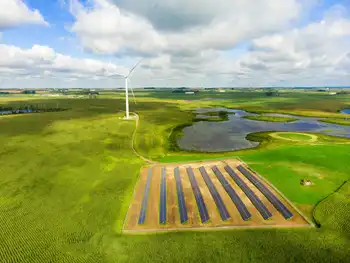Nuclear industry stands to get help from taxpayers to expand
CALVERT CLIFFS, MARYLAND - With the president leading the cheers, the nuclear industry is poised to receive a bounty of incentives from Congress that could subsidize construction of new nuclear reactors in central Illinois and several other locations.
President George W. Bush obecame the first president in 26 years to visit a nuclear plant, declaring near Washington that the nation needs nuclear power.
Speaking as the Senate neared a vote on legislation spelling out a new energy policy, Bush referred to nuclear power as "the one energy source that is completely domestic, plentiful in quantity, environmentally friendly and able to generate massive amounts of electricity."
The president offered his endorsement while touring the Calvert Cliffs nuclear plant in Maryland, 50 miles southeast of Washington, one of the plants that could receive incentives to expand from the new energy bill.
The Senate bill would place taxpayers squarely behind resuming new construction of nuclear plants for the first time in 30 years with tax credits that could reach $6 billion if fully used by the industry.
The legislation would authorize $2.7 billion for research and development over the next five years, similar to provisions in a bill already passed by the House. An additional $1.25 billion would be allocated for a nuclear reactor in Idaho that would try to generate hydrogen fuel.
The nuclear industry could have received even more subsidies under an amendment Wednesday to curb global warming. But after several hours of debate, the amendment, sponsored by Sens. John McCain, R-Ariz., and Joseph Lieberman, D-Conn., was defeated.
Meanwhile, the Senate legislation - as well as the House bill - would renew the half-century-old Price-Anderson Act limiting the liability of nuclear power plants in the event of an accident.
The provisions have generated a debate that the nuclear industry appears set to win in the Republican-controlled Congress.
Steve Kerekes, spokesman for the Nuclear Energy Institute in Washington, said the provisions amount to "kick-starting the first of the new orders of new nuclear power plants that we would be starting later this decade. We're talking about limited incentives for a limited period of time for a limited number of plants."
But Keith Ashdown, an energy analyst with the nonprofit Taxpayers for Common Sense in Washington, argued that the government should not be risking a bounty of tax dollars on an industry "that cannot exist in the private market without huge handouts from Uncle Sam."
"We pay for nuclear research and development," he said. "We're starting to pay for siting plants. We're backing loans to build the facilities. We're paying for the production of energy. Then we pay for the decommissioning of plants. There's no other industry that's completely subsidized from cradle to grave."
In his speech at the plant, Bush argued that government help for nuclear power is essential.
"It makes sense for the long-term economic security of our country to expand nuclear power, and on the other hand, say to those who are risking capital, 'Here's some help, here's some ways we can provide incentive for you to move for with the construction of plants.'"
Not since Jimmy Carter visited Three Mile Island in Pennsylvania after a near meltdown in 1979 had a president toured a nuclear plant. Clad in a white hard hat, Bush looked at a plan by Baltimore- based Constellation Energy to build a new reactor along Chesapeake Bay.
The Maryland plant is one of several being examined by the nuclear industry in a two-track effort to resume building at nuclear plants.
In May, NuStart Energy Development, a consortium of nuclear companies that includes Illinois-based Exelon Corp., put the Calvert Cliffs site on a list of six existing plants from which it intends to choose two for nuclear expansion.
Related News

Australia to head huge electricity and internet project in PNG
SIDNEY - Australia will lead a new multi-billion-dollar electricity and internet rollout in Papua New Guinea.
The Australian newspaper reported New Zealand the US, Japan and South Korea are supporting the project, which will be PNG's largest ever development investment.
The project will deliver internet to 70 percent of PNG and improve access to power.
Both China and the US are also expected to announce new investments in the region at the APEC summit this week.
Beijing will announce new mining and energy investments in PNG, and two Confucius Insitutes to be housed at PNG universities.




